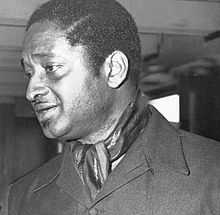Forbes Burnham
| Linden Forbes Sampson Burnham OE | |
|---|---|
 | |
| President of Guyana | |
| In office 6 October 1980 – 06 August 1985 | |
| Prime Minister | Ptolemy Reid |
| Preceded by | Arthur Chung |
| Succeeded by | Hugh Desmond Hoyte |
| Prime Minister of Guyana | |
| In office 26 May 1966 – 06 October 1980 | |
| President | Edward Victor Luckhoo Arthur Chung |
| Preceded by | Himself as Premier of British Guiana |
| Succeeded by | Ptolemy Reid |
| Premier of British Guiana | |
| In office 14 December 1964 – 26 May 1966 | |
| Monarch | Elizabeth II |
| Preceded by | Cheddi Jagan |
| Succeeded by | Himself as Prime Minister of Guyana |
| Personal details | |
| Born | 20 February 1923 Kitty, Georgetown, East Coast Demerara, British Guiana, British Empire |
| Died | 6 August 1985 (aged 62) Georgetown, East Coast Demerara, Guyana |
| Political party | PPP (1950-1958) PNC (1958-1985) |
| Spouse(s) | Bernice Lataste Viola Burnham |
| Children | Roxane Annabelle Francesca Melanie Ulele Kamana |
Linden Forbes Sampson Burnham (20 February 1923–6 August 1985) was a Guyanese political leader and leader of Guyana from 1964 until his death, as the Prime Minister from 1964 to 1980 and as President from 1980 to 1985.
Personal life and education
Burnham, an Afro-Guyanese, was born in Kitty, a suburb of Georgetown, East Demerara in Guyana, as one of three children. He attended the prestigious and the colony's elite Queen's College. In 1942, he won the Guiana Scholarship as the colony's top student. Burnham received a law degree from the University of London in 1948.
He was married to Viola Burnham, who was also involved in politics. He has three children, Roxane, Annabelle, and Francesca from his first marriage to Bernice Lataste. His second marriage to Viola produced two daughters, Melanie and Ulele and later a son Kamana (adopted).
Early years: The People's Progressive Party (PPP)
Burnham was one of the founding leaders of the People's Progressive Party (PPP), which was launched on January 1, 1950; the Indo-Guyanese labor leader Cheddi Jagan became PPP Leader, while Burnham became its Chairman.[1] In 1952, Burnham became the president of the party's affiliated trade union, the British Guiana Labour Union, in 1952. In 1953, the PPP won 18 of 24 seats in the first election permitted by the British colonial government. In the short-lived PPP government that followed, Burnham served as Minister of Education.[2]
In 1955, there was a split in the PPP between Burnham and Jagan. As a result, Burnham went on to form the People's National Congress in 1958 entering its first election under that name in 1961.
Leader of Guyana: The People's National Congress (PNC)
_under_President_LFS_Burnham.png)
In the 1964 election, while Jagan's PPP won the highest percentage of the vote (46% to the PNC's 41%), it did not win a majority. Burnham was able to form a coalition with the United Force (TUF) who won the remaining 12% of the votes and became premier of British Guiana on 14 December. On May 26, 1966, British Guiana became an independent country and was renamed to Guyana.
Burhnam at first pursued moderate policies. However, one of his first acts upon independence was a sweeping "National Security Act" giving the police the power to search, seize and arrest anyone virtually at will. He won full power in 1968, although the elections were condemned by many as fraudulent due to a large number of irregularities (such as questionable numbers of overseas voters on the rolls). In 1970, he veered sharply to the left and established strong relations with Cuba, the Soviet Union and other communist countries. On February 23 of that year, he declared Guyana a "co-operative republic." Adopting a policy of autarky, he banned all forms of imports into the country, including flour and varieties of rice. Burnham also nationalized the major industries that were foreign owned and controlled, reducing the private sector's share of the economy to 10 percent by 1979. Burnham's policies acted as a catalyst for the mass exodus in the 1980s that saw the country's population reduced significantly.
In 1974, Burnham declared the PNC to be paramount and socialist. He won a 1978 referendum which made it much easier for the government to change the constitution, but there was wide evidence that the referendum was tainted by fraud. Most notably, official figures showed the referendum passing with an implausible 97 percent of the vote. In 1980, the constitution was changed to make the president chief executive officer. He was elected president that year in elections condemned as fraudulent by international observers.
Burnham remained President of Guyana until his death. He died on August 6, 1985 after undergoing throat surgery in Georgetown Hospital.[2]
References
- ↑ History of the PPP, PPP website.
- ↑ 2.0 2.1 Biographies of former presidents, GINA.
| Preceded by Cheddi Jagan |
Premier of British Guiana 1964–1966 |
Succeeded by himself as Prime Minister of Guyana |
| Preceded by himself as Premier of British Guiana |
Prime Minister of Guyana 1966–1980 |
Succeeded by Ptolemy Reid |
| Preceded by Arthur Chung |
President of Guyana 1980–1985 |
Succeeded by Desmond Hoyte |
| ||||||||||||||
| |||||||